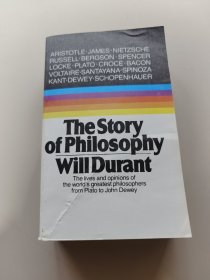
The Story of Philosophy:The Lives and Opinions of the World's Greatest Philosophers
¥ 20 2.6折 ¥ 76.8 九品
仅1件
作者William James Durant(威廉·杰姆斯·杜兰特) 著
出版社Simon & Schuster
出版时间1991-01
版次0002
装帧平装
货号山32
上书时间2024-11-22
- 最新上架
商品详情
- 品相描述:九品
图书标准信息
- 作者 William James Durant(威廉·杰姆斯·杜兰特) 著
- 出版社 Simon & Schuster
- 出版时间 1991-01
- 版次 0002
- ISBN 9780671739164
- 定价 76.80元
- 装帧 平装
- 开本 32开
- 纸张 胶版纸
- 页数 528页
- 正文语种 英语
- 【内容简介】
- Dr. Durant's outline includes not only lucid explanations of the great philosophies, but the careers of the philosophers and interpretations based upon the two-fold view, together with a host of good tales and merry quips by and about famous scholars from Socrates to Professor John Dewey.
- 【作者简介】
- American historian and essayist Will Durant was born in North Adams, Massachusetts. He earned his undergraduate degree at St. Peter's College in New Jersey and went on to earn a Ph.D. in philosophy in 1917 from Columbia University. While teaching at the libertarian Ferrer Modern School in New York, he had as a pupil a young woman named Ada Kaufman, whom he later called Ariel. She became his wife---and his coauthor. In 1917 Durant published his first work, his doctoral dissertation, Philosophy and the Social Problem . In 1926 he published another work, The Story of Philosophy. The following year, he began writing the comprehensive history of civilization on which he was to spend much of the next 30 years of his life, the massive Story of Civilization. By the time the seventh volume was published in 1961, Ariel Durant's diligent assistance on the project had earned her title-page recognition as coauthor. The Durants made several world tours to visit the countries they treated in their history and received countless honorary degrees. In 1968 they received the Pulitzer Prize for Rousseau and Revolution, the tenth and final volume of their story. Explaining why they stopped at this point in history, they wrote: "We find ourselves exhausted on reaching the French Revolution. We know that this event did not end history, but it ends us." The Durants brought popular history to the intelligent lay reader, a fact that Orville Prescott noted:"To introduce and to popularize is not less worthy an enterprise than to unearth some hitherto unknown facts or to present some new and controversial theory. Many professional historians believe that it is, and some have looked down their noses at the Durants. The truth is that the art of history includes both kinds of writing and needs both. The scholar who delves into obscure archives is essential; without him ignorance would prevail. But the writer who can make history available to the general reader is necessary too.
- 【目录】
-
Preface to the Second Edition
To the Reader
Introduction: On the Uses of Philosophy
Chapter 1: Plato
I. The Context of Plato 1
II. Socrates
III. The Preparation of Plato
IV. The Ethical Problem
V. The Political Problem
VI. The Psychological Problem
VII. The Psychological Solution
VIII. The Political Solution
IX. The Ethical Solution
X. Criticism
Chapter 2: Aristotle and Greek Science
I. The Historical Background
II. The Work of Aristotle
III. The Foundation of Logic
IV. The Organization of Science
1. Greek Science before Aristotle
2. Aristotle as a Naturalist
3. The Foundation of Biology
V. Metaphysics and the Nature of God
VI. Psychology and the Nature of Art
VII. Ethics and the Nature of Happiness
VIII. Politics
1. Communism and Conservatism
2. Marriage and Education
3. Democracy and Aristocracy
IX. Criticism
X. Later Life and Death
Chapter 3: Francis Bacon
I. From Aristotle to the Renaissance
II. The Political Career of Francis Bacon
III. The Essays
IV. The Great Reconstruction
1. The Advancement of Learning
2. The New Organon
3. The Utopia of Science
V. Criticism
VI. Epilogue
Chapter 4: Spinoza
I. Historical and Biographical
1. The Odyssey of the Jews
2. The Education of Spinoza
3. Excommunication
4. Retirement and Death
II. The Treatise on Religion and the State
III. The Improvement of the Intellect
IV. The Ethics
1. Nature and God
2. Matter and Mind
3. Intelligence and Morals
4. Religion and Immortality
V. The Political Treatise
VI. The Influence of Spinoza
Chapter 5: Voltaire and the French Enlightenment
I. Paris: ?dipe
II. London: Letters on the English
III. Cirey: The Romances
IV. Potsdam and Frederick
V. Les Délices: The Essay on Morals
VI. Ferney: Candide
VII. The Encyclopedia and the Philosophic Dictionary
VIII. ?crasez l'Infame
IX. Voltaire and Rousseau
X. Dénouement
Chapter 6: Immanuel Kant and German Idealism
I. Roads to Kant
1. From Voltaire to Kant
2. From Locke to Kant
3. From Rousseau to Kant
II. Kant Himself
III. The Critique of Pure Reason
1. Transcendental Esthetic
2. Transcendental Analytic
3. Transcendental Dialectic
IV. The Critique of Practical Reason
V. On Religion and Reason
VI. On Politics and Eternal Peace
VII. Criticism and Estimate
VIII. A Note on Hegel
Chapter 7: Schopenhauer
I. The Age
II. The Man
III. The World as Idea
IV. The World as Will
1. The Will to Live
2. The Will to Reproduce
V. The World as Evil
VI. The Wisdom of Life
1. Philosophy
2. Genius
3. Art
4. Religion
VII. The Wisdom of Death
VIII. Criticism
Chapter 8: Herbert Spencer
I. Comte and Darwin
II. The Development of Spencer
III. First Principles
1. The Unknowable
2. Evolution
IV. Biology: The Evolution of Life
V. Psychology: The Evolution of Mind
VI. Sociology: The Evolution of Society
VII. Ethics: The Evolution of Morals
VIII. Criticism
1. First Principles
2. Biology and Psychology
3. Sociology and Ethics
IX. Conclusion
Chapter 9: Friedrich Nietzsche
I. The Lineage of Nietzsche
II. Youth
III. Nietzsche and Wagner
IV. The Song of Zarathustra
V. Hero-Morality
VI. The Superman
VII. Decadence
VIII. Aristocracy
IX. Criticism
X. Finale
Chapter 10: Contemporary European Philosophers
I. Henri Bergson
1. The Revolt Against Materialism
2. Mind and Brain
3. Creative Evolution
4. Criticism
II. Benedetto Croce
1. The Man
2. The Philosophy of the Spirit
3. What Is Beauty?
4. Criticism
III. Bertrand Russell
1. The Logician
2. The Reformer
3. Epilogue
Chapter 11: Contemporary American Philosophers Introduction
I. George Santayana
1. Biographical
2. Scepticism and Animal Faith
3. Reason in Science
4. Reason in Religion
5. Reason in Society
6. Comment
II. William James
1. Personal
2. Pragmatism
3. Pluralism
4. Comment
III. John Dewey
1. Education
2. Instrumentalism
3. Science and Politics
Conclusion
Glossary
Index
相关推荐
-

CD:THE BEST OF PHIL COLLINS
九品杭州
¥ 28.00
-

CD:THE BEST OF PHIL COLLINS
八五品成都
¥ 35.00
-

THE BEST OF PHIL COLLINS (单碟装)
八五品北京
¥ 8.80
-

JET SEVEN THE ART OF PHIL NOTO
九品北京
¥ 60.00
-

The Story of Mankind
八品长沙
¥ 113.00
-

THE STORY OF GOLD
八五品衡水
¥ 5.94
-

Story of the Year
八五品衡水
¥ 80.94
-

the story of civilization
八五品运城
¥ 20.00
-

THE STORY OF MANKIND
七五品昆明
¥ 300.00
-

The Story of Ferdinand
八五品上海
¥ 19.82
— 没有更多了 —




















以下为对购买帮助不大的评价